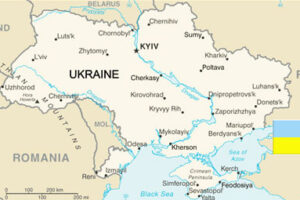Ukraine’s president tries to calm tensions as clashes continue

(Business New Europe – bne.eu – November 26, 2013) Huge pro-European crowds were out on the streets across Ukraine for a second night running on November 25, resulting in more clashes with riot police, who struggled to keep order.
Seeking to diffuse some of the popular anger against his government’s decision to freeze talks with the EU about an association and free trade pact, Ukrainian President Viktor Yanukovych appeared on national TV on the evening of November 25 to read out a statement that promised Ukraine was still on a European integration path and suggested a turn towards Russia was a temporary crisis-busting measure.
See the Kyiv Post’s photo collection here: http://www.kyivpost.com/multimedia/photo/maidan-tonight-332445.html
Crowds taunted the special forces with chants of “traitor”. The government has brought in units of the riot police to the capital from across the country.
At the same time, the government is trying to dial the tone of the protests down a notch. Chairman of the parliamentary group of the ruling Party of Regions, Mikhail Chechetov, said the authorities did not try to obstruct pro-EU protests in the capital: “Let these people stay on the square; they are not doing anything. Many have come from other locations; let them walk around Kyiv. Most important is to not litter the capital’s downtown.”
If that is the message, then someone forgot to tell the police. In the morning of November 25, police used tear gas and batons to disperse a crowd around the government headquarters after numerous protesters hurled rocks and tried to tear off officers’ helmets. The police responded by wielding batons and firing tear gas to clear protestors.
Later in the day, riot police used more tear gas in Yevropeiskaya Square in the capital, which has served as the gathering point for Ukrainians angered by the government decision on November 21 to freeze preparations to sign an Association Agreement and Deep and Comprehensive Free Trade Agreement with the EU at the EU summit on November 28-29.
Tensions are rising steadily as the crowds start to dig in for the long haul. Tents have been going on up on the Kreschatik in a repeat of the start of the Orange Revolution of 2004, when popular protests caused a rerun of the flawed second round of the presidential election won, ironically, by the current president Yanukovych. That repeat election was won by former president Viktor Yushchenko, who was defeated six years later by Yanukovych.
Jailed former prime minister Yulia Tymoshenko also got into the action, announcing she is going on hunger strike until the EU deal is unblocked. “I declare an indefinite hunger strike with a demand for Yanukovych to sign the association and free trade agreement with the European Union,” Tymoshenko wrote in a statement read out on Yevropeiskaya Square by her lawyer, Sergei Vlasenko.
Her daughter, Yevgenia Tymoshenko, whose political star is rising, also publicly called on German Chancellor Angela Merkel to get involved and pressure the Ukranian government to release her mother from a Ukrainian prison in order to receive medical treatment abroad.
“If my mother is not released soon, she will die. She is consciously denied medical treatment. She must go abroad,” said the younger Tymoshenko.
Yanukovych, who was prime minister under Leonid Kuchma, is clearly worried. His TV message was designed to quell some of the anger with a promise that Ukraine will eventually integrate with Europe.
“No one will rob us of the dream of a Ukraine of equal opportunities a European Ukraine,” Yanukovych said. “Just as no one will push us away from the righteous road that leads us to this dream.”
However, with a financial crisis looming, the government believes the EU has not offered enough money to keep the economy functioning so Yanukovych says he has been forced to find a “complex solution”, which boils down to asking Russia for money.
The Ukrainian government acknowledged last week that the country had already registered significant losses because of shrinking trade volumes with Russia and other members of the Commonwealth of Independent States, a loose alliance of former Soviet countries.
“I want peace and quiet to be in our big Ukrainian family,” Yanukovych said in his statement. “Like a father cannot leave his family without bread, I have no right to leave people to the mercy of fate with the problems that may arise if production stops under the pressure we feel and millions of citizens are thrown out to the streets,” he said, adding that he would “never take a single step to the detriment of Ukraine and the people.”
Other ministers were also visibly back-peddling on November 25. Prime Minister Mykola Azarov suggested that the EU’s association agreement could be signed if not now, then at an EU-Ukraine summit in the spring.
Foreign Minister Leonid Kozhara also told reporters that Ukraine had not altogether abandoned plans to sign landmark deals with the EU.
“Ukraine is not rejecting the agreement on association [with the EU], we are simply talking about suspension of its signing,” Kozhara said. “Neither Ukraine nor the EU are ready for this deal.”
However, the rhetoric coming out of Brussels is not as positive. Several high EU officials have said in the last days that “the door is still open” to Ukraine to sign the agreements at the EU summit in Vilnius on November 28-29. But commentators widely believe that if Kyiv fails to ink the document, then the EU, suffering from “Ukraine fatigue”, won’t offer any new deal for several years.
